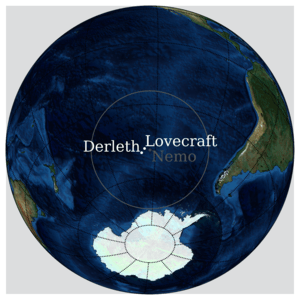R'lyeh
R'lyeh is a fictional lost city that was first documented in the H. P. Lovecraft short story "The Call of Cthulhu", first published in Weird Tales in June 1928. R'lyeh is a sunken city in the South Pacific and the prison of the entity called Cthulhu.

Description
The nightmare corpse-city of R'lyeh…was built in measureless eons behind history by the vast, loathsome shapes that seeped down from the dark stars. There lay great Cthulhu and his hordes, hidden in green slimy vaults.
— H. P. Lovecraft, "The Call of Cthulhu" (1928)
R'lyeh is characterized by bizarre architecture likened to non-Euclidean geometry. Norwegian sailor Gustaf Johansen, the narrator of one of the tales in the short story, describes the accidental discovery of the city: "a coast-line of mingled mud, ooze, and weedy Cyclopean masonry which can be nothing less than the tangible substance of earth's supreme terror—the nightmare corpse-city of R'lyeh...loathsomely redolent of spheres and dimensions apart from ours".[1] The short story also asserts the premise that while currently trapped in R'lyeh, Cthulhu will eventually return, with worshipers often repeating the phrase Ph'nglui mglw'nafh Cthulhu R'lyeh wgah'nagl fhtagn: "In his house at R'lyeh, dead Cthulhu waits dreaming".[1]
Lovecraft claims R'lyeh is located at 47°9′S 126°43′W in the southern Pacific Ocean.[1] Writer August Derleth, a contemporary correspondent of Lovecraft, placed R'lyeh at 49°51′S 128°34′W.[2] The latter coordinates place the city approximately 5,100 nautical miles (9,400 km) from the actual island of Pohnpei (Ponape), the location of the fictional "Ponape Scripture". Both locations are close to the Pacific pole of inaccessibility (48°52.6′S 123°23.6′W), the point in the ocean farthest from any land mass.
Other Cultural References
R'lyeh is the chief antagonist in the novel The City We Became by N. K. Jemisin.
See also
Notes
- H. P. Lovecraft, "The Call of Cthulhu" (1928)
- Derleth, A. The Black Island (1952)
References
- Derleth, August (2000) [1952]. "The Black Island". Quest for Cthulhu. New York: Carroll & Graf. ISBN 0-7867-0752-6.
- Harms, Daniel (1998). "R'lyeh". The Encyclopedia Cthulhiana (2nd ed.). Oakland, CA: Chaosium. pp. 255. ISBN 1-56882-119-0.
- Lovecraft, Howard P. (1984) [1928]. "The Call of Cthulhu". In S. T. Joshi (ed.). The Dunwich Horror and Others (9th corrected printing ed.). Sauk City, WI: Arkham House. ISBN 0-87054-037-8. Definitive version.
- Pearsall, Anthony B. (2005). The Lovecraft Lexicon (1st ed.). Tempe, AZ: New Falcon. ISBN 1-56184-129-3.
- Schweitzer, Darrell, ed. (2001). Discovering H. P. Lovecraft. Holicong, PA: Wildside Press. ISBN 1-58715-470-6.
External links
- A Colder War, Charles Stross (2000)